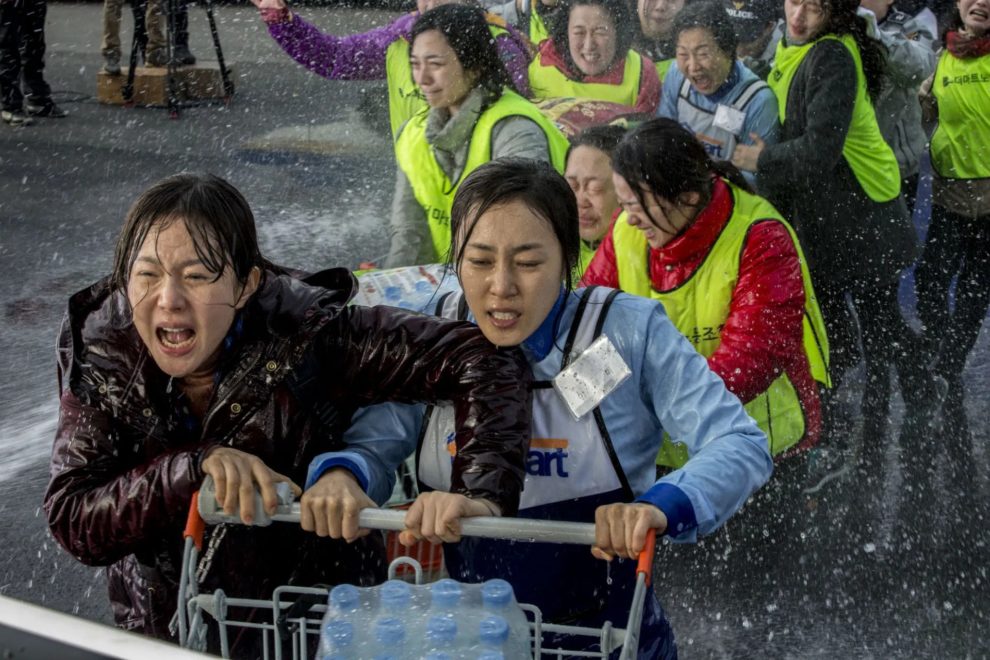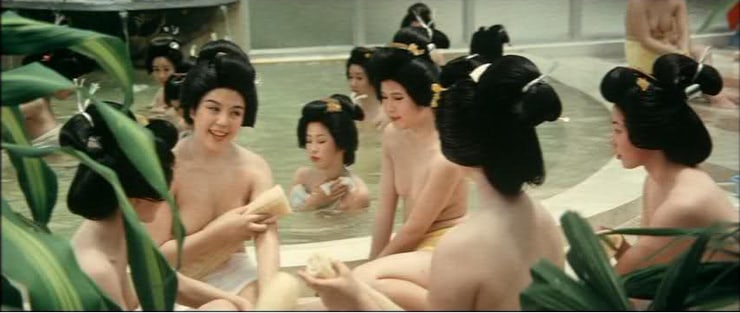Premiering in the City to City: Seoul sidebar of the 2014 Toronto International Film Festival, before it screened in Busan and Hawaii, “Cart” takes a rather thorough, if a bit melodramatic look at the lives of supermarket workers. I also have to admit that, since I had this type of job for almost 7 years, the movie hit a personal cord by highlighting the hardships these kinds of workers have to face.
One thing that has always been the case in this line of business is that, despite the difficulties it presents, particularly since it frequently involves heavy-lifting, it is being done mostly by women, particularly since the rule wants women to man the cashiers, while working the selves on the side. Furthermore, the managerial positions, particularly on the secondary, office level, are almost always taken up by men, creating an environment where men force underpaid women to work overtime without additional pay most of the time, kowtow to the clients even when they are offensive and impolite, and in general, work them to the bone even when it becomes evident they cannot go on. Furthermore, the employees are usually menial workers, meaning that the supermarket offers one of the few opportunities for work and even the possibility of eventually becoming a manager, which is one of the carrots corporations waive to people in order for them to apply for a job that is underpaid, at least in the beginning. Furthermore, these circumstances become even worse in a patriarchal society such as the Korean, an element that is also showcased here through the attitude of the higher ups. Even though this is not always the case, it is definitely the rule, with Boo Ji-young presenting these circumstances in all their appalling glory.
Seon-hee is a mother of two children, Tae-young, an adolescent boy and a younger girl, and tries to raise them by herself as her husband is frequently away on work. Seon-hee has been working on contract for a large discount store for five years, having been promised numerous times that she will eventually be promoted to a regular, full-time employee, something that applies to a number of part-time workers. Hye-mi is a single mother who is also in the same position, although her attitude is completely different from do-gooder Seon-hee, always denying overtime since she has to take care of her son. Soon-rye is an elderly cleaning lady in the same store, and in the same situation. Mi-jin is a university graduate who has also found herself in the same line of business.
Despite their different circumstances, one day, all the contract workers learn that they will be dismissed, despite the promises for the opposite, since the higher ups have decided that it makes more sense financially, to outsource this type of employment. Enervated, the women start preparing for a strike, even if not all of them are exactly willing to do so from the beginning. Eventually though, all join in, starting their strike during rush hour, and when the management brings in outside contract workers to take their stead, they decide to start sleeping in the storeto protect their strike. Sun-hee, despite her initial reluctance, finds herself on the front lines, in a series of events that also have an impact in her relationship with her distant son. A junior manager, Sun-hee also joins them after a time, but the company is set on not allowing them to win, and violence soon becomes a part of their tactics.
As already mentioned, the presentation of the circumstances in the particular line of work are presented quite realistically, with the pressure the employees feel from both customers and management being as back-breaking as the actual work they have to do most of the time. That they essentially have no rights and can be laid off at any time, despite their desperate need to have some kind of job is also highlighted, with the strike emerging as the only solution. The final outcome is also realistically showcased, exemplifying the value of “resisting” but also showing that full victories are very rarely achieved.
Apart from the general concept, the excellent cast take care of the rest of the narrative, with the charisma of a number of actresses truly filling the screen. Yum Jung-ah as Seon-hee is the main protagonist here, with her transformation from a timid pleaser to a true “fighter” being one of the best aspects of the movie. Moon Jeong-hee as Hye-mi is also quite good, also in the way her attitude changes towards Seon-hee, while Kim Young-ae as the feisty cleaner Soon-rye and Chun Woo-hee as Mi-jin round up an overall impressive female cast.
The premises of the movie are dramatic, but Boo takes care of also including moments of humor and overall entertainment, with the ways the workers find to spend the time in the store during the strike being particularly entertaining to watch. At the same time, and particularly close to the end, he does not manage to avoid the reef of the melodrama, with the music and the slow motion ending up being quite cheesy, as much as a number of episodes interspersed throughout the movie.
On the other hand, Kim Woo-hyung's cinematography captures the setting excellently, focusing on realism but not omitting to present a number of impressive images, most resulting from the amassing of workers in their varying uniforms. The scenes of violence are also quite elaborately portrayed, in a testament to Boo's ability to direct many actors at the same time on screen.
Despite some issues in the narrative here and there, “Cart” emerges as a rather interesting and rewarding movie, especially for its rather realistic rendition of a profession most people look down upon.

















